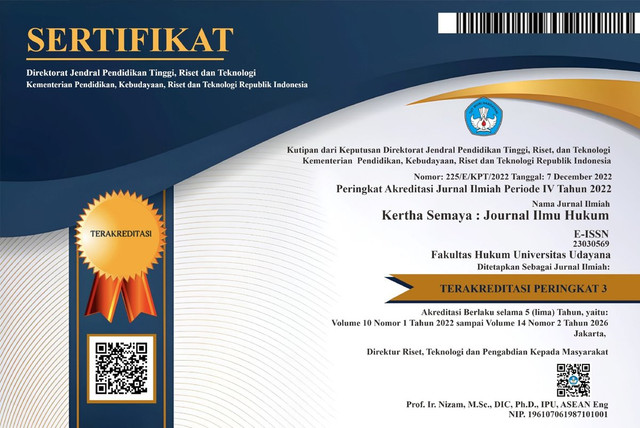TANGGUNG JAWAB MARKETPLACE ATAS KERUGIAN KONSUMEN DALAM TRANSAKSI E-COMMERCE
DOI:
https://doi.org/10.24843/KS.2025.v13.i09.p17Abstract
Penelitian ini bertujuan untuk menganalisis bentuk tanggung jawab marketplace terhadap kerugian konsumen dalam transaksi e-commerce di Indonesia serta mengkaji upaya hukum yang dapat ditempuh konsumen apabila marketplace tidak memenuhi kewajibannya. Metode penelitian yang digunakan adalah penelitian hukum normatif dengan pendekatan perundang-undangan, konseptual, dan kasus, yang didukung data primer melalui wawancara dengan akademisi dan praktisi hukum. Sumber hukum terdiri atas bahan hukum primer berupa Undang-Undang Nomor 8 Tahun 1999 tentang Perlindungan Konsumen, Undang-Undang Nomor 11 Tahun 2008 jo. Undang-Undang Nomor 19 Tahun 2016 tentang Informasi dan Transaksi Elektronik, serta Peraturan Pemerintah Nomor 80 Tahun 2019 tentang Perdagangan Melalui Sistem Elektronik, dilengkapi dengan literatur sekunder dan dokumen terkait. Hasil penelitian menunjukkan bahwa marketplace memiliki tanggung jawab hukum yang meliputi tanggung jawab kontraktual melalui mekanisme refund dan return, tanggung jawab preventif melalui verifikasi penjual serta sistem keamanan transaksi, dan tanggung jawab represif berupa kompensasi atau penggantian kerugian. Namun, dalam praktiknya, tanggung jawab marketplace masih terbatas pada aspek administratif sehingga seringkali belum memberikan perlindungan hukum yang efektif bagi konsumen. Konsumen yang dirugikan dapat menempuh upaya hukum non-litigasi melalui Badan Penyelesaian Sengketa Konsumen (BPSK), litigasi melalui gugatan perdata termasuk class action, maupun administratif melalui pengawasan pemerintah. Selain itu, penyelesaian sengketa elektronik (Online Dispute Resolution/ODR) berpotensi menjadi alternatif penyelesaian yang lebih efisien. Studi ini menegaskan perlunya penguatan regulasi dan mekanisme joint liability antara marketplace dan penjual untuk memastikan perlindungan konsumen yang lebih adil, seimbang, dan sesuai dengan dinamika perdagangan digital di Indonesia.
ABSTRACT
This study aims to analyze the form of marketplace responsibility for consumer losses in e-commerce transactions in Indonesia and examine the legal remedies that consumers can take if the marketplace does not fulfill its obligations. The research method used is normative legal research with a statutory, conceptual, and case approach, supported by primary data through interviews with academics and legal practitioners. Legal sources consist of primary legal materials in the form of Law Number 8 of 1999 concerning Consumer Protection, Law Number 11 of 2008 in conjunction with Law Number 19 of 2016 concerning Electronic Information and Transactions, and Government Regulation Number 80 of 2019 concerning Trading Through Electronic Systems, supplemented by secondary literature and related documents. The research results show that marketplaces have legal responsibilities that include contractual responsibilities through refund and return mechanisms, preventive responsibilities through seller verification and transaction security systems, and repressive responsibilities in the form of compensation or restitution. However, in practice, marketplace responsibilities are still limited to administrative aspects, often not providing effective legal protection for consumers. Aggrieved consumers can pursue non-litigation legal remedies through the Consumer Dispute Resolution Agency (BPSK), litigation through civil lawsuits including class actions, or administrative remedies through government supervision. In addition, electronic dispute resolution (ODR) has the potential to be a more efficient alternative resolution. This study emphasizes the need to strengthen regulations and joint liability mechanisms between marketplaces and sellers to ensure fairer, more balanced consumer protection, in line with the dynamics of digital commerce in Indonesia.
Downloads
Published
How to Cite
Issue
Section
License
Copyright (c) 2025 Rayhan Mohamad Athallah H. S, Ariawan Gunadi

This work is licensed under a Creative Commons Attribution-NonCommercial-ShareAlike 4.0 International License.



